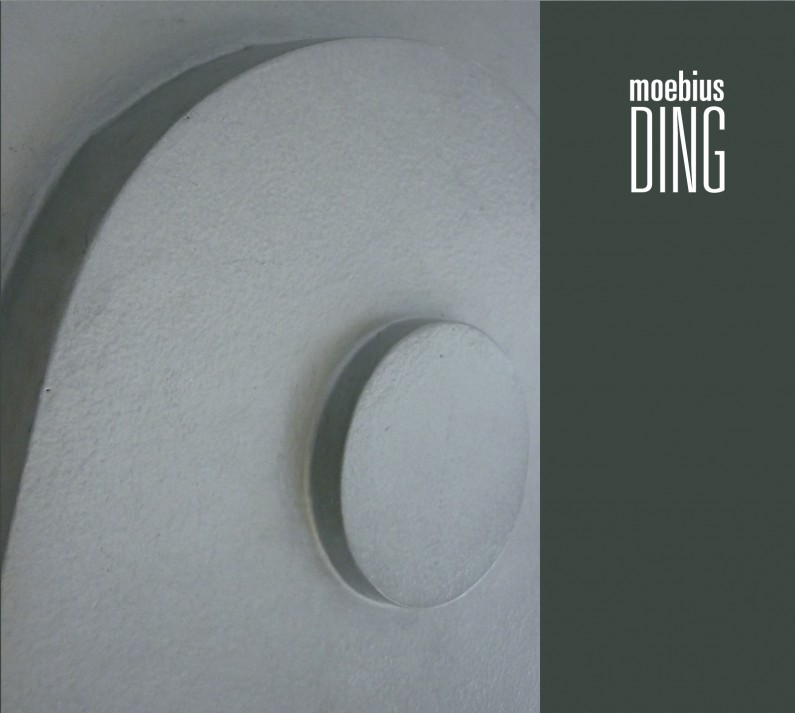DIETER MOEBIUS – Ding
Wollten wir einem Außerirdischen erklären, was Popmusik ist, so wären grobe Kategorisierungen sicher hilfreich. Vielleicht würde uns als erstes die althergebrachte Unterscheidung zwischen „Song“ und „Track“ einfallen. Ein Song besteht aus unterschiedlichen Strukturelementen (Strophe, Refrain), ein Track aus sich wiederholenden Einheiten. Mithin ist ein Track einfacher aufbaut als ein Song, zu dessen Strukturmerkmalen die eingebaute Dramatik per spannender Strophe und erlösendem Refrain gehört. Der Mehrwert, den der Track aus seinem repetitiven Wesen gewinnt, ist ein anderer. Er ist gefühlte Ewigkeit, eine Ahnung von Transzendenz, ein Echo archaischer Stammesrituale. Inzwischen wurde natürlich die Produktion repetitiver Musik so verfeinert, dass die Gleichförmigkeit des Materials nicht als solche erscheint. Aber noch oder wieder gibt es Produzenten, die die Haupteigenschaft eines Loops nicht durch ständige Variation verdecken. Dieter Moebius ist ein solcher Produzent. Seine Tracks sind wirklich und echt linear konstruiert. Dabei spielt es kaum eine Rolle, wie hoch die Ereignisdichte innerhalb eines seiner Stücke ist. Und die ist auf „Ding“ ausgesprochen hoch. Bereits das erste Stück „Walksol“ überrascht mit gegenläufiger Rhythmik und schleppend-wuchtigen Beats. Arabeskes weht heran, recht grob und rumpelig geht es zur Sache. Überhaupt ist „Ding“ im Vergleich zu den freundlichen Miniaturen auf dem Vorgängeralbum „Kram“ überraschend zupackend. Moebius, der Krautrock-Pionier, hat Schmutz und Patina wieder für sich entdeckt. Verschleppte Grooves und geisterhafte Sounds. Da ist „Flink“ mit seinem nervösen Puls. Oder das beatfreie „Alfred“, mit dem Klang eines Echolots. Das collagenhafte „Zufall“. Oder „Bone“ mit kühlen EBM-Sounds. Abstrakte Elektronik mit „Fou“ und „Ruston&Monotron“. Wie vielseitig die Musik des Dieter Moebius auch sein mag, sie trägt stets seine Signatur. Die sich überlagernden Schichten, die sich im Moment ihrer Gleichzeitigkeit aneinander reiben. Dann scheint der Track in der Schwebe zu bleiben, im luftleeren Raum zu hängen. Es vollzieht sich ein unmerklicher Ablösungsprozess. Und auf einmal hören wir ganz andere Musik. Denn mit jeder Schicht öffnet Moebius die Tür zu einer neuen Klangwelt, die oft ganz andere Eigenschaften hat als die klangliche Umgebung, aus der er uns gerade hinausgeführt hat. Bei allem klanglichen Abwechslungsreichtum heißt das dramaturgische Konzept des Dieter Moebius Linearität. Ereignis folgt auf Ereignis. Diese Abwesenheit von Steigerungen, dieser Stoizismus ist es, der die Klarheit und die hypnotische Kraft von Moebius’ Musik ausmacht. Takt für Takt will sie Endlosigkeit. Sie zieht uns hinein in jedes Stück und entfaltet ihre Magie vom ersten Moment an. Seit über 40 Jahren macht Dieter Moebius Musik. Sein Pionierstatus ist unbestritten. Zusammen mit Hans-Joachim Roedelius bildete er das Duo Cluster.
All music recorded by Dieter Moebius in Berlin 2010.
Mastering: Andreas Schmid, Faust-Studio Scheer
C: Klangbad 2011
P: faust studio 2011
Tracklisting:
1. Walksol
2. Defekt
3. Flink
4. Alaise
5. Neue news
6. Alfred
7. Ding
8. Zufall
9. Bone
10. Fou
11. Ruston&Monotron
–––––
If we wanted to explain to an alien what pop music is all about, then some rough categories would certainly be helpful. Perhaps the first thing to occur to us would be the time-honored differentiation between a "song" and a "track". A song consists of different structural elements (verses, chorus), while a track contains recurring units. Consequently, a track is more simply constructed than a song - whose distinguishing characteristics are the integral drama of an exciting verse and a redemptive chorus. The additional value the track gains from its repetitive nature is another. It's a value of felt eternity, an idea of transcendency, an echo of archaic rites.
Meanwhile, of course, the production of repetitive music has been refined to such an extent that the uniformity of the material doesn't seem as such. But there are still - or perhaps now again - producers who don't mask the main feature of a loop with constant variation. Dieter Moebius is one such producer. His tracks are really and truly linearly constructed. Therefore it hardly matters how tightly packed the events within one of his tracks may be. And the level of tightly packed events on „Ding“ is very high indeed.
The first track, "Walksol", already surprises us with rhythms moving in opposite directions of one another and beats which are both shuffling and forceful. Arabesque elements blow in, going at it, rough and rumbling. On the whole, "Ding" is surprisingly gripping and direct compared to the friendly miniatures of its predecessor, "Kram". Moebius, the krautrock pioneer, has rediscovered dirt and patina for himself. Shuffled grooves and spooky sounds. There's "Flink", with its nervous pulse. Or the beat-free "Alfred", with the sound of a sonar. The collage-like "Zufall" or "Bone", with its cold EBM sounds. Abstract electronica on "Fou" and "Ruston&Monotron".
However versatile the music of Dieter Moebius may be, it always bears his signature. The superimposed layers which which rub against each other during the moment of their simultanity. Then, the track seems to hover, as if suspended in a vacuum. An imperceptible process of a replacement takes place. Suddenly, we find ourselves listening to entirely different music. Because, with each layer, Moebius opens the door to a new world of sound, which often shows completely different characteristics than the sound environment he's just maneuvered us out of. Despite all of this diversity in sound, Dieter Moebius' concept of dramaturgy is linearity. One event follows another. This absence of escalations, this stoicism, make up the clarity and hypnotic power of Moebius' music.
Beat by beat, this music strives for endlessness. It drags us into each track and unfolds its magic from the very first moment on. Dieter Mobeius has been making music for more than forty years. His status as a pioneer is indisputable. Together with Hans-Joachim Roedelius, he formed the duo Cluster.
